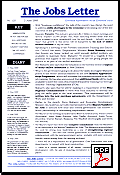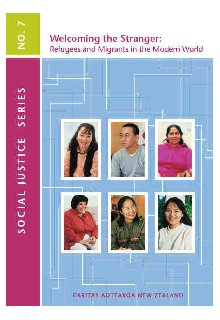



|
 |

|
| No.171 | 30 August 2002 | Essential Information on an Essential Issue |
OUR DIARY of key events over the last few weeks. WHO'S WHO 2002 We list the 2002 line-up of Ministers with employment and social services portfolios, and also the spokespeople from other parties. NZ FIRST and UNITED FUTURE What do NZ First and United Future believe in when it comes to employment issues? We would like to know too. COMMISSION FOR THE FAMILY Susan St John of the Child Poverty Action Group says that the “good intentions” behind a Commission for the Family are not enough ... we need wider discussion of its intentions. WINZ INTERNET UPGRADE Winz is to bring its job-matching services into the internet age. Jobseekers will soon be able to make direct contact with job opportunities. FUTURE OF WORK The Department of Labour is establishing a Future of Work research fund, and is looking for research proposals. YOUTH EMPLOYMENT TMP Business Consulting have completed their research report on Youth Employment in NZ. FUNDING TO COMMUNITY SECTOR Philanthropy NZ reports that the total funding to the community sector comes to more than $1.6 billion annually. REFUGEES and MIGRANTS The Catholic Church’s Social Justice Week will focus on the theme of refugees and migrants.  LAST Letter
LAST Letter
NEXT Letter   Download this issue as a PDF file
Index to Features
6 August 2002Air NZ is advertising to attract 150 more aircraft engineers. Australian and northern hemisphere airlines now make up about half of the workload for Air NZ’s aircraft maintenance business. An article in Salient, the Victoria University student magazine, includes a guide for students on how to marry in order to receive a student allowance. Married students under 25 years old qualify for a student allowance while single students — whose parents’ income is more than $28,080 — do not. 7 August 2002US president Bush says that his new powers to negotiate trade agreements will increase economic growth. Bush: “Trade is an important source of good jobs for our workers and a source of higher growth for our economy.” Act MP Muriel Newman complains that Employment Minister is refusing to give her information in response to parliamentary questions about the Pathways to Arts and Cultural Employment (Pace) scheme, which gives artists the dole while they concentrate on their art. Newman believes the scheme is trapping recipients on welfare. 8 August 2002Labour leader Helen Clark announces that Labour and the Progressive Coalition will operate a minority government with United Future promising to vote with the government on issues of confidence and money supply for the next three years. 9 August 200235 people have been banned from Wellington region Winz offices following incidents of threatening behaviour, damaging property or assault. Banned clients can nominate a person to act on their behalf. 11 August 2002Student debt is being blamed for a chronic shortage of veterinarians. Murray Gibb of the NZ Veterinarian Association says that the average vet graduate has $36,000 of debt. Higher salaries and the low value of the NZ dollar means that many graduates are leaving for Australia and the UK to work. While there were nearly 20,000 more workers employed in the health sector this year, the Health Workforce Advisory Group says that they are still not meeting demand. The staff increases have been generally in community services, part-time and temporary workers. 12 August 2002100 jobs go at the BHP NZ Steel mill in Glenbrook. The job cuts are blamed on the 30% tariff imposed earlier this year by the US on imported steel products. 14 August 2002The NZ Council of Trade Unions calls to raise the minimum wage to $10/hr and to abolish the youth minimum wage. The adult minimum wage is currently $8/hr and the youth rate is $6.40/hr. After months of laying-off staff without making any public acknowledgement, the IBM Corporation says it is in the process of cutting 15,600 jobs from its global workforce. 15 August 2002Act MP Deborah Coddington says that, in calling for a lift to the minimum wage, the CTU “couldn’t care less about NZ’ers struggling to get ahead” Coddington: “When the boot of Government stamps on the aspirations of business, the first to suffer are the community's poorest. Employers can't hire more staff if flexibility and choice are replaced with increased taxes and compliance costs.” 16 August 2002Teachers at state kindergartens accept an offer that will bring them to pay parity with primary and secondary teachers by 2006. The five-stage pay parity schedule does not apply to the staff of the 80% of pre-schools that are privately run. Only 10% of people who change jobs do it for an increase in pay. Recruitment consultancy Robert Walters says most workers leave because they either see another firm as offering better career prospects or they were seeking new challenges. 18 August 2002The forestry industry and its staffing needs are expected to increase threefold over the next three to five years. Forestry companies are already finding it difficult to find workers. Consultant Bruce Willis says that in Gisborne, the problem is not a lack of numbers, but of skilled workers. Central North Island workers are reportedly being lured to away to work in Northland, Gisborne and the Hawke’s Bay. The University Students Association reports that women graduating with a 1-year certificate from polytechnic will take an average of 23 years to repay their student loan. KPMG Consulting hopes to employ an additional 100 – 200 software developers in NZ by the end of 2003. Managing director Thomas Gary says they intend to do more work in-house rather than having it done in India. While NZ software development costs are about 10% higher than in India, the NZ costs are one-third of that in the US. In Argentina, unemployment is now estimated to be at 21.5% and 36 million people are living in poverty. An advertising campaign by the New South Wales government to attract doctors to work in the outback from NZ, UK, US, Ireland and Canada has had just two responses. Tourism Industry CEO John Moriarty is critical of local authorities who are calling for powers to tax tourism in their local areas. Moriarty says tourism taxes would lead to job reductions. 19 August 2002Some university students have reportedly used their interest-free student loan money to invest in the share market. A Ministry of Education spokesperson says there was no evidence that indicated the practice was widespread and that the take up rate for student loans has not increased since the interest free loan policy was implemented. 20 August 2002Finding young people with the skills to become an electrician is becoming more difficult, according to Ian Nunn whose job it is to fill electrical training places in the central North Island. Nunn says that electricians are getting older and not enough young people are taking up the trade. 21 August 2002As many as 2,000 mentally ill people are homeless, and another 8,000 cannot find affordable or suitable accommodation according to Mental Health and Independent Housing Needs published by the Ministry of Social Development. 22 August 2002Economic Development Minister Jim Anderton says he welcomes the establishment of the Auckland Regional Development Strategy group — which is the first time that every local authority in Auckland has co-operated on a large-scale, regional economic development initiative. Anderton also says he is making Auckland a priority for economic development in this term of office ... after having concentrated on the provincial regions of New Zealand over the last two years.
 LAST Diary
LAST Diary
NEXT Diary 
|
NZ FIRST AND UNITED FUTURE .... WHAT DO THEY BELIEVE IN? With NZ First, we did contact the party before the election to ask them to fill out their policy platform in terms of employment issues (see special issue of The Jobs Letter No.168), but — unlike every other party — they never got back to us. NZ First really only campaigned on three issues during the election —”fixing up” the immigration mess, the Treaty of Waitangi “industry”, and law and order. Given their thirteen parliamentary seats, we thought we would try again for this issue ... but unfortunately, despite our phonecalls and emails, we got the same lack of response.  But it seems they were also unable to give us any detail. The United Future staff at least wrote and told us they were unable to make our deadline. They told us that things have “been extremely mad around here over the past few days ...” as parliament was just starting up again and new staff were being appointed. The party has however appointed a spokesperson on employment issues, Paul Adams (who is eighth on their party list).
Source –comment from The Jobs Letter Editors; emails to and from NZ First and United Future August 2002FOCUSSING ON THE FAMILYAs part of its support for confidence and supply to the Labour government over the next three years, the party has won support for a Commission for the Family which will take into consideration the United Future policy platforms. Susan St John of the Child Poverty Action Group argues that these family policy platforms deserve thorough and critical scrutiny. She says that the “good intentions” behind the policies are not enough, and there needs to be a proper cost benefit analysis of the new Commission and a wider discussion of the purpose or the need for it before it proceeds. St John: “There are already academic centres in various universities for the child and family, to say nothing of the research projects already undertaken at great expense in the Ministry of Social Development. How much costly duplication is going to be involved? How much is the structure itself going to cost to run and staff? Will it mean the income improvements for families, that must occur if the costs of child poverty are to be averted, will be delayed yet again while the Commission is being established?” — Extending the Child Tax Credit of fifteen dollars per child per week to all low-income families. (Cost: around $250m) Source – Press Release Child Poverty Action Group (Susan St John) 13 August 2002 “Good Intentions Are Not Enough”ACT ON THE FAMILYACT is also calling for the government to abandon its plans for a Commission, and instead adopt a proactive plan to improve the lot of families. For Newman, this would include: scrapping the Independent Youth Benefit; transforming the DPB into a stepping-stone to work; introducing Shared Parenting and opening up the Family Court; encouraging adoption; as well as lowering taxes to lift the disposable incomes of families. Source — “The Politics of Family” by Muriel Newman’s, weekly column (email distribution) 26 August 2002WINZ JOBS REGISTER TO GO ON-LINEWinz will try to match the existing services provided by many privately-run Net recruitment agencies. It plans to allow jobseekers to store their CV on the Winz database which can then be forwarded electronically to an employer. The new services will also provide self-assessment tools to help jobseekers gauge their suitability for a position. At an appointment, the case manager (or “work broker”) could access the vacancy database on their computer terminal. If a suitable job was found, the case manager would provide an introduction for the jobseeker to the employer. Currently, a jobseeker can view the job vacancy database from a home computer. The information available is the general title of the job, whether it is temporary or permanent, the hours, pay rate, skills requirements and where it is located. But in order to apply for a job, the jobseeker must contact their case manager to get the specifics about the name of the company and whom to contact for an interview. — For more information see www.work.govt.nz Source—The Dominion Post Infotech 19 August 2002 “Internet service for job-seekers” by Tom Pullar-Strecker; Steve Maharey Backgrounder on the Skills Information Action Plan (www.work.govt.nz).FUTURE OF WORK RESEARCH TENDERS— Labour force participation rates — Work-life balance issues — Economic growth and labour market outcomes The Department is particularly interested in sponsoring proposals to investigate how these issues impact Maori labour market outcomes. Deadline for Proposals is 1st October 2002. Projects funded in this financial year will need to be completed by 31st May 2003. For more information, contact william.dillingham@lmpg.dol.govt.nz Source — Request for Proposal forms from Labour Market Policy Group (LMPG)NZBCSD YOUTH EMPLOYMENT REPORTThe TMP research report will be used by Business Council members and by Mayors in fostering an understanding of the causes of youth unemployment, and developing an awareness of the impact on business. The report brings together current data on youth employment and unemployment in NZ, as well as the results of a survey of Schools Careers Advisors, and the opinions of focus groups run in a selection of Auckland secondary schools. The research report will contribute to the publication of a guide and a website that the Business Council hopes will educate businesses on the issues of youth unemployment, motivate them to accept the challenge of youth employment, and equip them with the necessary tools and resources to take on the challenge. This project should be completed by the end of this year. — TMP Research Report on Youth Employment, July 2002, can be downloaded (31 pg, 1.7MB) from the NZBCSD website at www.nzbcsd.org.nz/project.asp?ProjectID=7 Some of the youth employment initiatives envisaged by Business Council members may include: member businesses reporting against youth employment targets; employer mentoring; employer representation on school Boards of Trustees; school partnerships; sponsoring training courses and equipment; funding training delivery; scholarships, competitions and awards; employer organisations acting as hiring brokers; linking with school’s careers advisory services; and involvement in pre-apprenticeship work skills programmes. — Powerpoint summaries of the NZBCSD presentations to the Local Government NZ Conference are available at www.nzbcsd.org.nz/story.asp?StoryID=153 Source – “Youth Employment Research Report” presented to the NZ Council for Sustainable Development (July 2002) by tmp.worldwide; www.nzbcsd.org.nzFUNDING TO THE COMMUNITY SECTORCentral government funding accounted for 56% ($920m), while personal donations from the public made up 17% ($282m). The proceeds of gambling contributed 14% ($222m) to the total, with philanthropic and grant making trusts making up a further 9% ($143m)of funding. Philanthropy NZ says that health and social services, followed by sport and recreation, then education and research are the biggest recipients of philanthropic and local government community funding. Two thirds of the proceeds from gambling fund the sport and recreation sector, and a further quarter fund health and welfare. — The full Philanthropy NZ report (cost: $35.00) can be ordered from Jolly Fernandes phone 04-499-4090 Source – Philanthropy NZ newsletter August 2002 “Funding to Community Sector more than $1.6 billion annually”; also Philanthropy NZ website at www.philanthropy.org.nzCATHOLIC SOCIAL JUSTICE WEEK September 15-21 is the Catholic Church’s Social Justice Week, and this year they are focussing on the theme of refugees and migrants in New Zealand. As in previous years, Caritas (the Catholic Agency for Justice, Peace and Development) has published a discussion booklet. September 15-21 is the Catholic Church’s Social Justice Week, and this year they are focussing on the theme of refugees and migrants in New Zealand. As in previous years, Caritas (the Catholic Agency for Justice, Peace and Development) has published a discussion booklet.
Caritas believes that all aspects of NZ society — community, business and government — should work with new settlers to ensure that they are able to find meaningful employment. From the booklet: “Employment is a major concern for new settlers. It is a key element necessary in the reconstruction of their lives, in regaining a sense of identity and of self-worth, and in integrating successfully into the community. In working environments people develop their language skills, broaden their understanding of “kiwi” society, develop crucial community networks, and, if they are lucky, develop further skills in their area of expertise. “ Through employment, new settlers are able to contribute in a meaningful way to the country that has offered them refuge or welcomed them as labour migrants. They often view employment as a way in which they can repay the hospitality they have received from their new country. For those who are unemployed, there are feelings of frustration, even shame and guilt.“ — “Welcoming the Stranger: Refugees and Migrants in the Modern World” by Susan Atkin and Louise May for Caritas Aotearoa, (cost: $4.50) available from P.O.Box 12-193, Thorndon, Wellington or caritas@caritas.org.nz
BRIEFING PAPERSHere are the Briefing papers for Jim Anderton’s Ministry of Economic Development and Industry NZ:
|